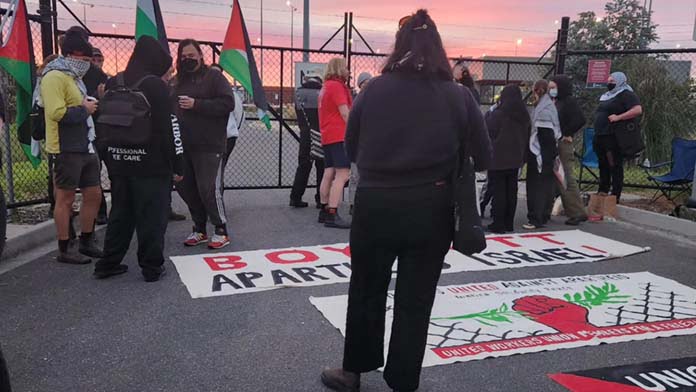For almost four days in January protest action with workers refusing to cross the community picket succeeded in preventing work on the ZIM shipping-line at Webb Dock in Melbourne.
It was another blow against the Israeli government and an indication of the kind of action that can extend the Palestine movement to stop business as usual and the murderous assault on Gaza.
The brutal use of riot cops armed with pepper spray and horses to end the protest was yet another indication of the Australian state’s support for Israeli genocide in Gaza.
The wharfies at Victoria International Container Terminal (VICT) showed great courage, refusing to be bused into work after WorkSafe officials indicated they could be safely escorted by police through the community picket.
But instead of the community picket line building greater solidarity between the workers at Webb Dock, their union and the Palestinian movement, it has produced serious tensions between the protesters and the MUA.
Tensions
The Israeli shipping line ZIM has been the target of protests in Australia and around the world.
In Australia, following the protest in Sydney in November where 23 people were arrested under harsh anti-protest laws, there have been community pickets in both Melbourne and Fremantle. In both cities liaison with MUA officials and rank-and-file workers meant that the wharfies respected the community picket and so refused to work the ZIM ship.
This was possible because of the health and safety issues posed by the picket, which meant the union could legally refuse to work and still be paid. Fremantle pickets, for instance, stopped two shifts on 2 December.
On Friday 19 January, Trade Unionists for Palestine (TU4P) Melbourne declared a community picket, hoping to repeat the success in stopping shifts going in to work on a ZIM ship.
This time, workers’ respect for the community picket meant there was enthusiasm for extending the action. Initially the community picket held on the basis of workers’ safety concerns. But by Saturday afternoon, WorkSafe officers had declared that it was safe for police to escort workers onto the dock. The workers had lost their legal safety justification that allowed them to refuse to work.
On Saturday afternoon the company arranged a bus to escort workers though the picket line. To their credit, the MUA workers refused to board the bus. The company responded by standing workers down without pay.
The MUA called to end the picket on Sunday once they could no longer cite health and safety reasons for refusing to work. However this was ignored, damaging the relationship with the MUA and placing a question mark over any future community pickets on the docks.
No shortcuts
To get around the wharfies’ reluctance to use the bus, the company organised boats to get them to the dock.
By Sunday morning the ZIM ship was being worked. Unfortunately some people on the picket resisted arguments from members of TU4P to lift the picket line and thought they could continue picketing regardless of the concerns of the workers and the MUA.
The confusion on the picket became more and more obvious. Some openly argued that the role of the picket was to substitute for the workers taking action. On Monday afternoon, much larger numbers of police were mobilised to clear the gates of VICT.
Community pickets are not an end in themselves. They work only for as long as they are supported by the dock workers. But they cannot substitute for industrial bans by the workers, such as the ban by transport workers in Belgium on handling arms exports to Israel.
The strategic aim of the Palestine movement must be to win dock workers and the MUA to refuse to work ZIM ships altogether, just as wharfies banned South African ships during the struggle against apartheid and refused to transport weapons to the Vietnam War.
As Israel wages its bloody assault in Rafah, the need for actions that target the links between Australia and Israel is greater than ever.
The fight against ZIM has continued. On 4 February there was another successful action where three community pickets shut down access to the port to delay ZIM vessel the Alabama in Fremantle.
The same week Palestinians addressed workers at Patrick terminal at Port Botany in Sydney, preparing the ground for future action.
A protest outside Downing Centre court in defence of the 23 ZIM Port Botany arrestees was also addressed by Paul Keating, MUA Sydney Branch Secretary and ASU NSW & ACT Secretary Angus McFarland.
Learning the lessons from Webb Dock and continuing to build strong links with unions and workers will be essential to building the kind of fight we need against ZIM and apartheid Israel.
By Ian Rintoul and Adam Adelpour






